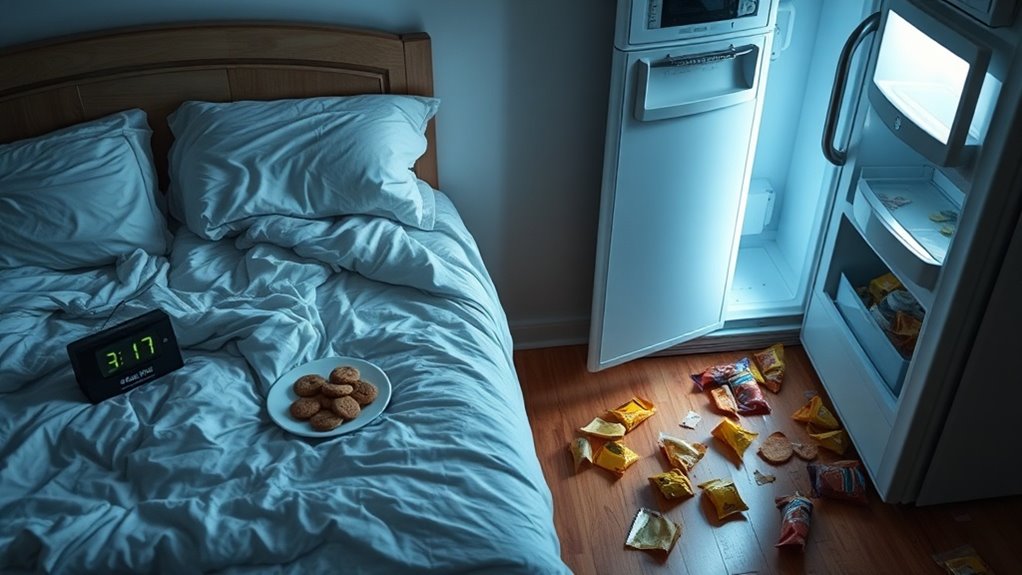Lose More Fat by Sleeping Better-Here’s How
Imagine sinking into a cool, dark room, where the weight of the day slips away as you drift into a restful sleep. This serene state isn’t just blissful; it’s essential for your weight loss journey. Quality sleep plays a crucial role in regulating hormones that influence hunger and metabolism. Curious about how you can harness sleep to enhance your fat loss efforts? Let’s explore the science behind it and discover practical tips for better rest.
Key Takeaways
- Prioritize 7-9 hours of quality sleep to regulate hunger hormones ghrelin and leptin, enhancing fat loss effectiveness.
- Establish a consistent sleep schedule to support your circadian rhythm and improve overall sleep quality.
- Create a calming bedtime routine to promote relaxation and reduce stress, aiding better sleep.
- Optimize your sleep environment by keeping it dark, cool, and quiet to enhance restfulness.
- Limit screen time before bed to reduce blue light exposure, which can disrupt melatonin production and sleep quality.
The Science of Sleep and Fat Loss
Quality sleep is crucial for fat loss, as it regulates hormones like ghrelin and leptin, which control hunger and satiety.
When you skimp on sleep, ghrelin increases, making you crave more high-calorie foods, while leptin decreases, leaving you feeling less full.
This imbalance can lead to weight gain.
Furthermore, inadequate sleep affects your energy levels, making it harder to stay active and burn calories.
Prioritizing sleep for fat loss not only improves your mood and focus but also enhances your body’s ability to shed unwanted fat effectively. Establishing a relaxing bedtime routine can further support these benefits, so aim for 7-9 hours each night.
How Sleep Affects Your Metabolism
Sleep doesn’t just influence hormones; it also plays a significant role in regulating your metabolism.
When you don’t get enough quality sleep, your body struggles to maintain metabolic balance, which can hinder fat loss.
Here’s how sleep impacts your metabolism:
- Hormonal Regulation: Sleep helps manage leptin and ghrelin, hormones that control hunger and satiety.
- Insulin Sensitivity: Adequate sleep improves insulin sensitivity, aiding in better glucose metabolism.
- Energy Expenditure: Poor sleep can decrease your overall energy expenditure, making weight loss tougher.
- Muscle Repair: Quality sleep supports muscle recovery, which is essential for maintaining a healthy metabolic rate.
Additionally, adequate rest is crucial for balancing hormones that regulate hunger and appetite, which can further enhance your weight loss efforts.
Tips for Improving Sleep Quality
To enhance your sleep quality and, in turn, support your weight loss journey, consider implementing several practical strategies. Start by establishing a consistent sleep schedule, creating a calming bedtime routine, and minimizing screen time before bed. Additionally, ensure your sleep environment is dark, cool, and quiet. Remember that good sleep improves metabolism and helps resist late-night snacking.
| Strategy | Benefits | Tips |
|---|---|---|
| Consistent Sleep Schedule | Regulates circadian rhythm | Go to bed and wake up at the same time daily |
| Calming Bedtime Routine | Promotes relaxation | Try reading or meditating |
| Screen Time Reduction | Reduces blue light exposure | Limit screens 30 minutes before bed |
| Optimal Sleep Environment | Enhances sleep quality | Use blackout curtains and a white noise machine |
The Role of Sleep in Appetite Regulation
A good night’s rest plays a crucial role in regulating your appetite and cravings.
When you’re sleep-deprived, your body can struggle to manage hunger hormones, leading to increased cravings.
Here’s how sleep impacts your appetite:
- Hormonal Imbalance: Lack of sleep boosts ghrelin (hunger hormone) and lowers leptin (satiety hormone).
- Increased Cravings: Sleep deprivation heightens cravings for high-calorie, sugary foods.
- Emotional Eating: Fatigue often triggers emotional eating, as you seek comfort in food.
- Impaired Decision-Making: When tired, you’re more likely to make poor dietary choices.
Additionally, adequate sleep is essential for regulating hunger-controlling hormones, making it vital for weight management.
Prioritize sleep to help maintain a healthy appetite and support your fat loss goals.
Creating a Sleep-Friendly Environment
Creating a tranquil atmosphere can significantly enhance your sleep quality, making it easier to shed those unwanted pounds.
Start by keeping your bedroom dark; consider blackout curtains to block out disruptive light.
A cool temperature—around 60 to 67 degrees Fahrenheit—helps signal your body that it’s time to sleep.
Minimize noise with earplugs or a white noise machine.
Invest in a comfortable mattress and pillows that support your sleeping style.
Finally, limit electronic devices before bedtime to reduce blue light exposure, which can interfere with melatonin production. Additionally, maintaining a cool temperature may also promote fat loss by triggering your body’s response to cold exposure, enhancing metabolism and aiding weight loss efforts.





